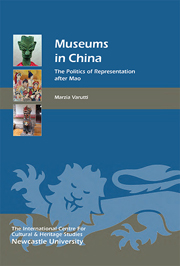Book contents
- Frontmatter
- Contents
- List of Illustrations
- Acknowledgments
- Chronology
- List of Abbreviations
- Introduction
- 1 Cultural Heritage in China
- 2 Museums in China: origins and Development
- 3 New Actors in the Chinese Museum World
- 4 Museum objects and the Chinese nation
- 5 The nation in the Museum
- 6 The Politics of the Past
- 7 The Representation of the Past in China's Museums
- 8 The Politics of identity
- 9 The Museum Representation of ethnic Minorities
- 10 Techniques and sites of Display of ethnic Minorities
- Conclusions: The new Museums of China
- Appendix: List of Museums in China Visited by the Author
- Bibliography and References
- Index
- Heritage Matters
8 - The Politics of identity
Published online by Cambridge University Press: 05 March 2014
- Frontmatter
- Contents
- List of Illustrations
- Acknowledgments
- Chronology
- List of Abbreviations
- Introduction
- 1 Cultural Heritage in China
- 2 Museums in China: origins and Development
- 3 New Actors in the Chinese Museum World
- 4 Museum objects and the Chinese nation
- 5 The nation in the Museum
- 6 The Politics of the Past
- 7 The Representation of the Past in China's Museums
- 8 The Politics of identity
- 9 The Museum Representation of ethnic Minorities
- 10 Techniques and sites of Display of ethnic Minorities
- Conclusions: The new Museums of China
- Appendix: List of Museums in China Visited by the Author
- Bibliography and References
- Index
- Heritage Matters
Summary
The previous chapter examined how the national past has been interpreted and represented in Chinese museums. In most instances, the re-evocation of the past is instrumental to the unfolding of narratives centred on the present and future of the Chinese nation. As the scholars of China Yih-Jye Hwang and Florian Schneider (2011, 42) remark in their analysis of the People's Republic of China's 60th anniversary celebrations in 2009, ‘the parade has moved the ideological legitimacy basis of the Party significantly away from its revolutionary heritage to a mixture of nationalism and the current administration's interpretation of Chinese modernity’. Notions of nationalism and modernity are key to the interpretation of current Party rhetoric and shed light on the narratives of the nation presented in contemporary Chinese museums. This chapter focuses on how the narratives of the ancient and recent past are used in museums to shape the image of the present-day Chinese nation. The expression of Chinese national identity is changing. Increasingly, narratives on cultural nationalism are replacing political indoctrination. Analysis suggests that two main narrative strands emerge from current museum representations of the Chinese nation.
A first set of narratives focuses on the Chinese nation as a civic project and extols aspects of Chinese culture, industry, science and technology. Museums as diverse as those representing silk, tea, tobacco, post and banks all convey a nationalistic message.
- Type
- Chapter
- Information
- Museums in ChinaThe Politics of Representation after Mao, pp. 121 - 128Publisher: Boydell & BrewerPrint publication year: 2014

